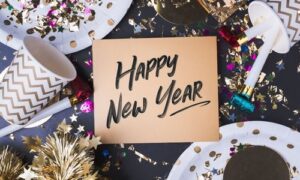
We always get excited about a new year because everyone is thinking about setting resolutions. New Frontiers loves resolutions because that is the business we are in: Helping others both set and achieve their goals. When setting your resolutions for this year, remember to do two things to increase the odds of following through and achieving them:
- Learn from previous resolutions
- Set the right resolutions
Learn from previous resolutions:
-
Keep track of your resolutions:
- Does anyone remember their resolutions from last year? Personally, I do not. It is highly unlikely that you will follow through with resolutions that you set if you do not remember them, so be sure to memorialize and revisit them often.
-
Do not let perfection be the enemy of progress:
- Too often, we give up on our resolutions because we slip up. Some people are great at following through for the first two months of the year, but then start to slide. Even if you do nothing for your resolution for an entire month, remember you can always get back on that wagon!
-
Adapting our resolutions:
- If you set a resolution last year, but did not follow through with it, take a moment to think about the reasons why. Were the goals too abstract? Did you develop a clear plan to achieve them? Frequently, we set the same resolutions as the previous year, without adapting any strategies to actually achieve them. I want to lose weight! I want to read more! I am going to start saving money! All of these resolutions are missing a key component: HOW? Grab a friend, sit down, and make a plan. If the resolution is to save money, think about how this hasn’t worked in the past. Maybe you need to set up an automatic transfer, or open a savings account so that you separate your money. There isn’t one right way, but you can learn from the past to better inform you on what to do differently this year.
Setting the Right Resolutions
SMART Goals: SMART stands for Specific, Measurable, Attainable, Relevant, and Time-Based. Whenever you are setting resolutions, follow these 5 criteria:
-
Specific
- “I want to lose weight,” or “I want to read more” are vague resolutions. Better alternatives include specific benchmarks, such as “I want to lose 10 pounds,” or “I want to read 12 books.”
-
Measurable
- The previous two examples have numerical values associated with them, which allows us to measure our progress. If it is September and you’ve only read 2 books, cue in “Houston, we’ve got a problem.” Tracking our progress towards our goals is essential in helping us change strategies that are not working.
-
Attainable
- Resolutions are attainable when we truly believe we can achieve them. I know some people say, “shoot for the stars and you’ll at least reach the moon,” but this adage can also be demotivating. If you set out to read 12 books, but currently never read, you may be setting yourself up for failure.
-
Relevant
- Resolutions are relevant when they are going to motivate you and help you better yourself. Resolutions are really longer-term goals that we hope will make our lives better. If you set goals that are not relevant to your happiness or health, they may be difficult to achieve.
-
Time-Based
- You have a year! Now break down that resolution into smaller components. Reading 12 books in a year can easily break down to, “I will read one book a month.” Time helps hold us accountable when it comes to follow through.
Some final advice: Take time to be mindful of your resolutions. Think of resolutions that work for you. Any progress towards a resolution is growth! If you never read, but you read 3 books out of 12, that is progress.
Lastly, check out some potential resolutions below in case you need a little inspiration (but remember, your resolutions should resonate with you!):
- Video chat with friends that you have not been able to see in person. Come up with a list of people you want to stay in touch with, and connect with each of them once a month through the year.
- Learn more about a subject or topic you are unfamiliar with. Read, watch instructional videos, and educate your friends and colleagues on what you learn
- Study a new language to be able to communicate in a country you would like to travel to or to converse with people in their native language
- Develop a new hobby and practice it at least once a month (painting, photography, poetry, coding, Photoshop, etc.)
Keep a diary or journal memorializing your resolutions and progress towards them. You’ve got this – good luck and Happy New Year!





